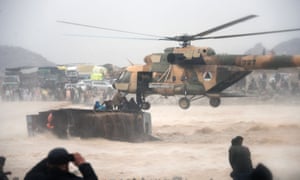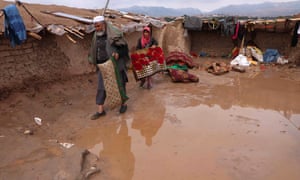Thousands of homes swept away as rains follow devastating drought, with UN ‘shocked’ by lack of crisis funding support.

An Afghan military helicopter rescues people clinging to the top of an overturned truck, in the flooded area of Arghandab district in Kandahar province. Photograph: Javed Tanveer/AFP/Getty Images
Afghanistan has been hit with the worst flooding in seven years, with 20 dead, thousands of homes swept away and many families, already displaced by drought, forced to leave their homes for the second time.
The latest climate shock, which affected eight provinces including Kandahar, came as the UN’s humanitarian coordinator in Afghanistan criticised the European Commission for its “wholly insufficient” response to hunger and suffering in a country already in the grip of what analysts describe as the world’s deadliest conflict.
Toby Lanzer said he was “shocked and surprised” at the low level of engagement from donors to the crisis in Afghanistan, where more than 13 million people are severely food insecure and a further 3.6 million are “one step away from famine”. The levels of hunger, he said, were unprecedented, after an 11-month drought which has ravaged the north and west of the country. He said the suffering on the ground was “as bad as I’ve ever seen”.
“It is a combination of high levels of violence, a devastating drought, bitter cold and abject poverty. It is a very chilling reality.”
Lanzer, the UN’s deputy special representative in Afghanistan, said the UN had set a “modest” target of $612m (£465m) to appeal to donors. It is only 3% funded so far, “which at the end of February is shocking”, he said.
Afghanistan has suffered the worst drought in recent years, resulting in the humanitarian crisis that has displaced 260,000, more people last year than the war between Afghan forces and the Taliban. Flash floods are common after a drought, because it kills bushes and other vegetation that trap water as well as drying out land, further limiting water absorption during heavy rains.
Khalil ur Rehman, 54, a farmer from southern Kandahar province, told the Guardian: “We are again on the move, but this time due to flooding. Last year our entire family had left the village because of drought which had severely affected agriculture and now rains have destroyed our livestock.”
Kandahar province received 75mm of rainfall last year, much less than the required level of at least 400 a year.
Abdul Hanan Moneeb, the province’s deputy governor, said an estimated 2,000 homes had been damaged by the floods.

“The current flooding is the worst in at least seven years,” said Moneeb. “It has destroyed the nomadic herders’ camps and caused loss of their livestock.”
Heavy snowfall across Afghanistan has cut off many areas and raised fears of further floods in the spring.
Ahmad Tamim Azimi, of Afghanistan National Disaster Management Authority, said Kandahar, Herat and Farah were the worst affected areas.
“Since February, at least 95 people have been killed across Afghanistan and 10 people are missing from Kandahar,” Azimi said. “We have requested the INGOs provide relief to the people across the country.”
The European Commission is providing an initial donation of €25m to meet humanitarian need in Afghanistan, but said it may give more depending on future requirements.
“It is somewhat surprising, as people who are in deep distress move,” said Lanzer. “First they move inside the country, and then they move to Europe. This is one of the points I made in Brussels.”
Afghans make up the largest group of asylum seekers travelling to Europe, after Syrians, according to the latest Eurostat data.
The main donors to the UN’s humanitarian efforts in Afghanistan last year were the US, with $183m, the UK, with $82m, and the European Commission, with $48m.
Lanzer said the UK had been generous last year and he was confident of its continuing support, expecting an announcement soon.
An EU official said the commission was a “leading global donor” for Afghanistan and had announced €474m in 2018 to support state building and public reforms, as well as for migration and displacement challenges.